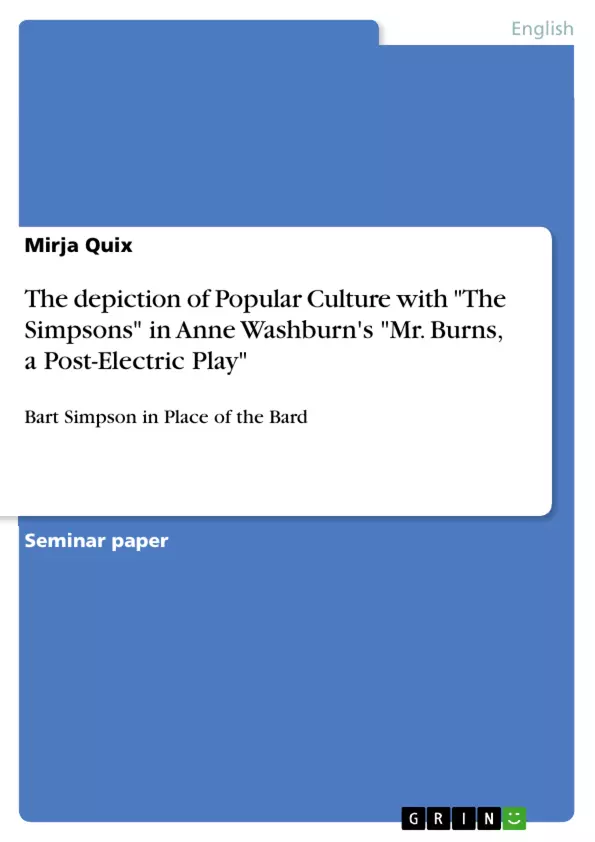A main objective of The Simpsons series seems to be to take every day issues and world events as a part of its stories and to deal with them in a satirical way. While it also concerns itself with apparently banal issues like popular movies or bands, war, politics or nuclear power do not make an exception in the series’ content.
Mick Broderick points out, that “while many episodes ostensibly do not touch on nuclear themes, the ever- present influence and immanence of the atomic age pervades The Simpsons like a thematic half- life whose motifs contaminate the multi- layered, intertextual narratives of each episode, often as satire.”
At this background, Anne Washburn’s decision to take The Simpsons, of all things, as the one part of popular culture that survives inside the people’s memories throughout a nuclear apocalypse, seems even more peculiar and ironic. But that’s just what happens in Washburn’s “Mr. Burns – A post- electric play”. The electric grid is destroyed and people have to adapt to a world without telephones, television, electric stoves or radiators. They have to revert to older ways of engagement, like storytelling, but instead of higher literature they reminisce about parts of popular culture everyone remembers.
The following paper therefore will analyse Anne Washburn’s play in regard to the way popular culture is represented in her post- apocalyptic world. Why is it important and why is The Simpsons Washburn’s main representative of contemporary popular culture in the play? And, moreover, in which ways does the representational form of popular culture change throughout it?
Table of Contents
- Introduction
- Popular Culture and the play as such
- Popular Culture and its importance in modern times
- The use of The Simpsons as representatives of Popular Culture
- The dystopic setting of Mr. Burns, A post- electric play.
- Popular Culture as diversion from reality..
- Popular Culture as livelihood: Theatre Companies
- Commercials.
- Music and Popular Culture.
- Popular Culture merged with reality
Objectives and Key Themes
This paper aims to analyse Anne Washburn's play "Mr. Burns - A post-electric play" in regard to the way popular culture is represented in her post-apocalyptic world. It examines why The Simpsons is chosen as the main representative of contemporary popular culture in the play and explores how the representational form of popular culture changes throughout the narrative.
- The significance of popular culture in a post-apocalyptic society
- The role of The Simpsons as a cultural touchstone
- The evolution of popular culture representation in the play
- The impact of the dystopian setting on cultural practices
- The interplay between popular culture and survival
Chapter Summaries
The introduction sets the context by highlighting the satirical nature of The Simpsons and its use of everyday issues and world events. It introduces Anne Washburn's play "Mr. Burns - A post-electric play" and its unique premise of The Simpsons surviving a nuclear apocalypse. The paper then delves into the concept of popular culture, exploring its complexity and its evolving meaning throughout history. It examines the reasons why The Simpsons became a powerful representative of popular culture, highlighting its satirical approach, its wide reach, and its enduring cultural impact. The paper then explores the dystopian setting of the play and how the characters adapt to a world without technology, relying on storytelling to maintain their connection to the past. The chapter summaries will continue to analyze the play's themes, focusing on how popular culture serves as a source of entertainment, livelihood, and a reflection of the changing realities of the post-apocalyptic world.
Keywords
The main keywords and focus topics of this paper include popular culture, post-apocalyptic setting, The Simpsons, dystopia, cultural representation, adaptation, survival, storytelling, entertainment, livelihood, and societal change.
Frequently Asked Questions
Why does "The Simpsons" feature in a post-apocalyptic play?
In Anne Washburn's play, "The Simpsons" serves as a shared cultural memory that survives a nuclear apocalypse, replacing traditional high literature as a form of storytelling.
What is the central premise of "Mr. Burns, a Post-Electric Play"?
After the collapse of the electric grid, survivors recount episodes of "The Simpsons" to maintain a connection to the past, eventually turning these stories into ritualistic theater.
How does popular culture function in a dystopian setting?
Popular culture acts as a diversion from a harsh reality, a source of livelihood for theater companies, and a way for society to adapt and find meaning after a catastrophe.
Why did the author choose "The Simpsons" specifically?
"The Simpsons" is a powerful representative of pop culture due to its satirical nature, wide reach, and its ability to incorporate world events into its narrative.
How does the representation of pop culture change in the play?
It evolves from simple fireside storytelling to professional theater productions and finally into a mythic, ritualized form of cultural heritage decades later.
- Quote paper
- Mirja Quix (Author), 2014, The depiction of Popular Culture with "The Simpsons" in Anne Washburn's "Mr. Burns, a Post-Electric Play", Munich, GRIN Verlag, https://www.grin.com/document/302770



